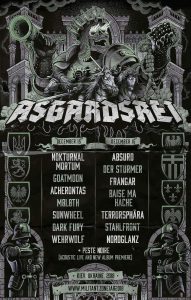If I wanted to provide an example of the Faustian spirit at work, I would probably point to the Asgardsrei festival. Just think about what would be the most extreme and difficult event to organize. A NSBM festival would be high on the list. After you organize it, authorities in your country attack it, and you become an unwanted and unwelcome person in your own fatherland. What do you do? You move to a different country and proceed with your work. (more…)
Tag: Baron von Ungern-Sternberg
-
August 16, 2012 Julius Evola
Baron von Ungern-Sternberg
English original here
V polední době se objevila spousta spisů o postavě, o níž se, i přes její mimořádný význam ve vřavách první světové války, ví jen málo: mluvím o Romanu Mikolaji Maximilianu von Ungern-Sternbergovi.
Ferdinand Ossendowski byl prvním, kdo o něm, s využitím patřičných dramatizačních efektů, psal ve svém slavném a docela kontroverzním díle Bestie, lidé a bohové. (more…)
-
4,492 words
Editor’s Note:
The following two chapters from Ferdinand Ossendowski’s Beasts, Men, and Gods
give a good sense of Baron Roman Nikolai Maximilian von Ungern-Sternberg’s qualities and vision. Ossendowski joined the baron’s army as a commanding officer of one of his self-defense troops. He also briefly became Ungern-Sternberg’s political advisor and chief of intelligence. Ungern-Sternberg sent Ossendowski on a diplomatic mission to Japan and the United States, and when the baron’s regime collapsed, Ossendowski stayed on in the United States and wrote Beasts, Men, and Gods, which was published in 1922.
-
1,598 words
Translated by Greg Johnson
Czech translation here
Translator’s Note:
The following text, published in 1942 or 1943 under the title “Baron von Ungern Venerated in Mongolian Temples,” deals with one of the 20th century’s most enigmatic figures whom I first encountered in the pages of Ferdinand Ossendowski’s brilliant Beasts, Men, and Gods.


